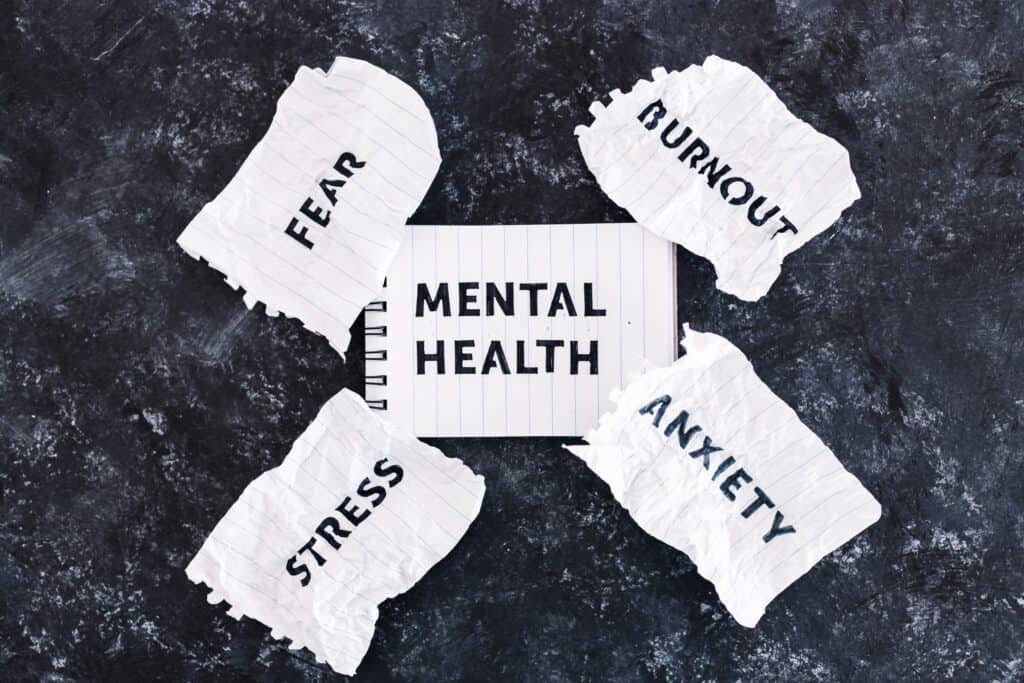Let’s face it: when it comes to mental health, men have been dodging the conversation like it’s a bad blind date. But here’s the thing – there’s a good reason for not talking about it!
While many campaigns are dedicated to raising awareness about men’s mental health and well-being, the stigma and judgement from others make it difficult for men to open up.
So, let’s dive into the real issues and talk about what’s going on and how you can actually support men.
What’s Going on with Men’s Mental Health?

Men experience all kinds of mental issues. According to ADAA, 1 in 10 suffer from male depression or anxiety.
For some men, this can also lead to drinking too much alcohol or taking drugs.
In fact, it’s thought that at least 20% of males in the world experience mental health issues at some stage of their lives.
Because of societal expectations, stigma and judgement from others, a lot of guys avoid talking about their struggles or trying to seek support.
This leads men to display their emotional distress through anger or irritability. You could say that it’s like constructing IKEA furniture with no instructions – things get frustrating really fast.
Why Do So Many Men Struggle with Mental Health?
So, why are men’s mental health issues such a big problem? Well, the reasons are varied. Societal expectations, cultural norms, and even factors like unemployment or financial stress play a part. Men often feel they have to keep it all together, even when everything is falling apart.
This is normally men trying to protect loved ones.
And here’s a harsh reality: men are more likely to die by suicide than women. The CDC reports that men have the highest suicide rates in the U.S. This has also been well documented as a worldwide trend, giving clear sign that something needs to change.
The Stigma Behind Men’s Mental Health
Women generally express sadness and their problems to others, more specifically to their husbands, who will stand by them 99% of the time. For a man, it is completely different.
It goes back to the saying, “Man up!”
Now, I’m not actually disagreeing with that statement, as I think there are times in a man’s life when we need to just man up. This is what makes men strong, appealing, and able to get stuff done.
However, there are times when men need to open up about things they might be concerned about but unfortunately feel they can’t. Yet, if they could, it might be the catalyst for overcoming any problems confidently.
The Canadian Journal of Psychiatry points out that stigma plays a huge role in preventing men from seeking treatment. Fewer men than women access support such as therapy or counselling services, which only makes things worse.
The result? A lot of men end up internalising their problems, which can lead to suicidal thoughts or other serious mental health problems. Not exactly the manliest outcome.
But why can’t men be open about their feelings?
The honest answer …
People don’t want to hear your problems!
I know that sounds harsh, but that’s the truth. I’m saying this because I want to help men who are experiencing mental health problems. I don’t want them to lose relationships through expressing these feelings to the wrong person.
Who Can Men Share Their Mental Health Issues with?

As a man, it’s extremely important who you share your thoughts and feelings with.
Being open to the wrong person may lead to being judged negatively. Things such as:
- Not being masculine
- Being weak
- Incompetent
Unfortunately, one of the main culprits for this is women.
Now, I want to be clear – I’m not blaming women for negatively judging and not respecting a man as much as they did. It is simply human nature and the reality in which we live. Plus, there are exceptions.
But this is why I will always encourage men to open up to other men.
I’m not saying all men will be non-judgemental or perceive you differently. You should still carefully select who you talk to.
However, if you genuinely have a close male friend, they are more likely to listen and care about what you’re dealing with.
In fact, chances are they have experienced the same thing at some point.
Coping Strategies for Men’s Mental Health: Let’s Get Practical
Now we’ve established that men’s mental health is a serious issue, let’s talk about what to do about it.
Here are a few tips that can make a difference:
Physical activity

Physical exercise is good for your mental well-being and physical health. I’m sure you’ve heard it before, but it’s worth repeating. Research shows that people who do not participate in physical activity are more likely to show symptoms of depression and anxiety.
So, whether lifting weights or hitting the walking trails, doing something physical can be a great outlet for pent-up stress.
Talking therapies
Creating spaces where men can talk about their experiences without judgement is crucial. Whether it’s with a professional therapist or spending time with a good friend over beers, talking about what’s bothering you can be a major relief.
Seek professional help
When things get tough and you have no one to talk to, seek professional help. Therapy, a trained crisis counsellor, or support groups can provide a safe space to explore what’s going on and develop coping strategies. Think of it like hiring a personal coach to help with your mental fitness.
How to Help a Man Who’s Struggling

Here’s the thing …
If you notice a guy in your life showing signs of mental distress, don’t brush it off. Men aren’t always the best at recognising when they’re struggling, so it might be up to you to step in.
But how?
Spot the warning signs

- Mood swings
- Withdrawing socially
- Low mood
- Not getting enough sleep
- Constantly irritable
These are red flags worth paying attention to.
Create a judgement-free zone
Make it clear that you’re there to listen, not to judge. Ask open-ended questions and really listen. Do not give advice unless he asks for it. Sometimes, all a guy needs is someone to hear him out without immediately jumping to solutions.
Encourage professional support
If things seem serious, gently nudge him toward seeing a professional. Offer to go with him or help find someone to talk to – even that small bit of support can make the whole process feel less daunting.
Wrapping it Up: It’s Time to Take Action
If there’s one takeaway from all this, it’s that men’s mental health is no joke. The stigma that surrounds men’s mental health needs to be tackled head-on, and it’s up to all of us to create a world where guys feel comfortable talking about their struggles.
So, whether you’re a guy looking for support or someone trying to help, remember – you’re not alone.
Mental well-being issues are real. So reach out, talk to the right person, and most importantly – take charge of your mental well-being.
Let’s make sure no man feels like he has to go it alone.
Frequently Asked Questions
When is Mental Health Week?
Men’s Health Week takes place during the run-up to Father’s Day, between 10th – 16th of June 2024. It is used to raise awareness about men’s health concerns.
What is the common mental health problem in men?
The common conditions include depression, anxiety, bipolar, PTSD and substance misuse.


